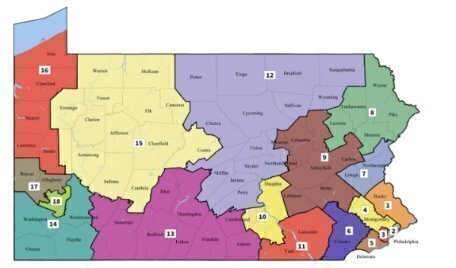A three-judge federal court in Harrisburg, PA, has refused – for now – to block Pennsylvania officials from going forward with plans to hold congressional elections this year using new districts drafted by the state’s Supreme Court.
 In a three-page order issued Friday afternoon, the panel indicated that it probably will not take any further action on the use of the map until after it holds a hearing two weeks from now, on March 9. At that hearing, it will consider the request of Republican lawmakers to issue a lasting and formal order against the court-drawn plan.
In a three-page order issued Friday afternoon, the panel indicated that it probably will not take any further action on the use of the map until after it holds a hearing two weeks from now, on March 9. At that hearing, it will consider the request of Republican lawmakers to issue a lasting and formal order against the court-drawn plan.
The key issue at that hearing will be whether the state’s highest court violated the federal Constitution by drawing new lines for electing the state’s 18 members of the U.S. House of Representatives, to replace a map the court had struck down under the state constitution.
Technically, what the judges did on Friday was to deny a “temporary restraining order” that would have immediately blocked implementation of the court map for a period of 14 days, while the court studied the more lasting order against the map’s use – that is, a “preliminary injunction” that would not have an expiration date. The March 9 hearing was scheduled to consider that injunction request.
Normally, the denial of a restraining order (often referred to, for short, as a “TRO”) is not subject to appeal. Only an injunction or its denial could be appealed, under normal procedures.
Thus, it appears that the only way that the Republican challengers of the state court’s new map could prevent its use in election planning would be to persuade the Supreme Court in a separate maneuver to block it pending an appeal to the Justices directly from the Pennsylvania Supreme Court. While GOP legislative leaders have said they were asking the Justices for such a delay, the legal papers to do so still had not been docketed with the Justices as of Friday evening.
The case before the federal trial court in Harrisburg is separate from the case that the GOP leaders have said they are challenging before the Justices in Washington, D.C. Both, however, are based on the same claim: that the state Supreme Court “usurped” the role of the Pennsylvania state legislature when it undertook to draft new congressional districting lines after striking down a 2011 map used in three past elections as a “partisan gerrymander” in violation of the state constitution of Pennsylvania. The claim of a “usurpation” is based on the Elections Clause of the national Constitution’s Article I.
In Friday’s order, the Harrisburg-based court laid out a series of scheduling dates to prepare for the March 9 hearing on the plea for a more lasting delay of use of the court-drawn map.
In refusing an immediate “TRO” against implementing that map, the three-judge panel ruled that the Republican lawmakers had not shown a sufficient harm to their legal interests as to justify such an order at this point. It said the finding of a lack of harm was due in part to the judges’ willingness to put on a fast schedule the review of the injunction request and due in part to the judges’ desire to hear from all of the parties involved.
Between now and the March 9 hearing, the panel of judges may rule on whether to allow entry into the case, in defense of the state court’s map and rulings on the issue, of the League of Women Voters and Democratic voters who won the case in state court and the entry of a recently established advocacy group – the National Democratic Redistricting Committee – that is taking action in 12 states to challenge “partisan gerrymandering” in favor of Republican candidates for office.
Those potential “intervenors” are trying to enter the case with arguments that they would provide a stronger defense of the map than will the two state election officials who have been sued in the case.
The three-judge panel in Harrisburg is made up of U.S. Circuit Judge Kent A. Jordan of Wilmington, Del., who is a member of the U.S. Court of Appeals for the Third Circuit; and U.S. District Judges Christopher C. Conner, who is chief judge in Harrisburg, and Jerome B. Simandle, who sits on a federal trial court in Camden, N.J.
Legendary journalist Lyle Denniston has written for us as a contributor since June 2011 and has covered the Supreme Court since 1958. His work also appears on lyldenlawnews.com.







